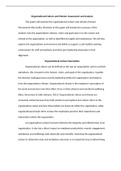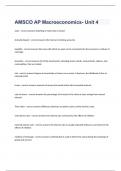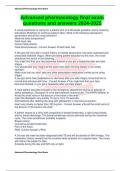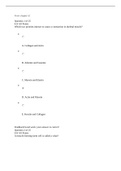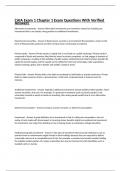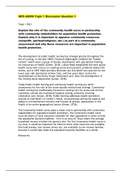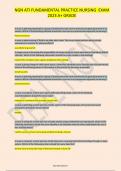[Date]
FUR2601 Assignment
2 Semester 2 2024 -
DUE 27 September
2024
QUESTIONS WITH ANSWERS
,FUR2601 Assignment 2 Semester 2 2024 - DUE 27 September 2024
Question 1
Describe The Role Of And How Extensively The Constitutional Court Used
International Law As Well As Foreign Law In The Interpretation Of The Rights In
The Bill Of Rights. (10 Marks)
The Role and Extent of International and Foreign Law in Interpreting the Bill
of Rights by the Constitutional Court
Role of International Law
1. Guiding Principles:
The Constitutional Court of South Africa is mandated by the Constitution to
consider international law when interpreting the Bill of Rights. Section 39(1)(b) of
the Constitution explicitly states that courts "must consider international law"
when interpreting the Bill of Rights. This provision underscores the importance of
aligning South Africa’s human rights jurisprudence with international human rights
standards.
2. Binding Treaties:
International treaties that South Africa is a party to, such as the International
Covenant on Civil and Political Rights (ICCPR) and the International Covenant on
Economic, Social and Cultural Rights (ICESCR), provide binding obligations that
the Constitutional Court uses as benchmarks for interpreting rights within the Bill
of Rights.
3. Customary International Law:
Customary international law, which consists of practices and norms that have
achieved a general acceptance as law, also plays a critical role. The Court
, acknowledges these norms, especially where they concern fundamental human
rights recognized globally.
4. Soft Law:
While not binding, soft law instruments such as United Nations declarations,
resolutions, and guidelines also influence the Court's interpretation. These
instruments, though not legally binding, reflect the evolving standards and
expectations of the international community regarding human rights.
Extent of International Law Usage
1. Precedent Setting Cases:
The Constitutional Court has frequently cited international law in landmark cases.
For instance, in S v Makwanyane (1995), the Court referred extensively to
international human rights instruments to support its decision to abolish the death
penalty, highlighting the right to life and human dignity.
2. Comparative Analysis:
In Glenister v President of the Republic of South Africa (2011), the Court used
international law to bolster its decision on the need for an independent anti-
corruption unit, referencing obligations under international conventions such as the
United Nations Convention against Corruption.
3. Development of Jurisprudence:
The Court has utilized international law to develop a robust and progressive human
rights jurisprudence. This approach helps ensure that South African law remains
dynamic and responsive to global human rights trends.
Role of Foreign Law
FUR2601 Assignment
2 Semester 2 2024 -
DUE 27 September
2024
QUESTIONS WITH ANSWERS
,FUR2601 Assignment 2 Semester 2 2024 - DUE 27 September 2024
Question 1
Describe The Role Of And How Extensively The Constitutional Court Used
International Law As Well As Foreign Law In The Interpretation Of The Rights In
The Bill Of Rights. (10 Marks)
The Role and Extent of International and Foreign Law in Interpreting the Bill
of Rights by the Constitutional Court
Role of International Law
1. Guiding Principles:
The Constitutional Court of South Africa is mandated by the Constitution to
consider international law when interpreting the Bill of Rights. Section 39(1)(b) of
the Constitution explicitly states that courts "must consider international law"
when interpreting the Bill of Rights. This provision underscores the importance of
aligning South Africa’s human rights jurisprudence with international human rights
standards.
2. Binding Treaties:
International treaties that South Africa is a party to, such as the International
Covenant on Civil and Political Rights (ICCPR) and the International Covenant on
Economic, Social and Cultural Rights (ICESCR), provide binding obligations that
the Constitutional Court uses as benchmarks for interpreting rights within the Bill
of Rights.
3. Customary International Law:
Customary international law, which consists of practices and norms that have
achieved a general acceptance as law, also plays a critical role. The Court
, acknowledges these norms, especially where they concern fundamental human
rights recognized globally.
4. Soft Law:
While not binding, soft law instruments such as United Nations declarations,
resolutions, and guidelines also influence the Court's interpretation. These
instruments, though not legally binding, reflect the evolving standards and
expectations of the international community regarding human rights.
Extent of International Law Usage
1. Precedent Setting Cases:
The Constitutional Court has frequently cited international law in landmark cases.
For instance, in S v Makwanyane (1995), the Court referred extensively to
international human rights instruments to support its decision to abolish the death
penalty, highlighting the right to life and human dignity.
2. Comparative Analysis:
In Glenister v President of the Republic of South Africa (2011), the Court used
international law to bolster its decision on the need for an independent anti-
corruption unit, referencing obligations under international conventions such as the
United Nations Convention against Corruption.
3. Development of Jurisprudence:
The Court has utilized international law to develop a robust and progressive human
rights jurisprudence. This approach helps ensure that South African law remains
dynamic and responsive to global human rights trends.
Role of Foreign Law


